Treasure Trove A Collection of ICSE Poems Workbook Answers Chapter 5 Television – ICSE Class 10, 9 English
ICSE SolutionsSelina ICSE SolutionsML Aggarwal Solutions
EnglishMathsPhysicsChemistryBiology
Comprehension Passages
Lines 1-16
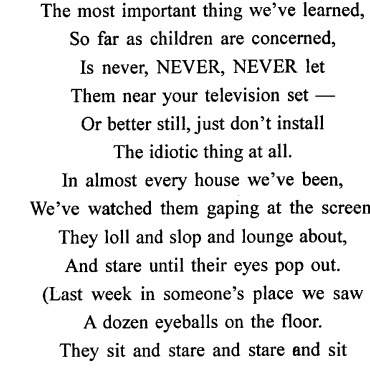

Read the lines given above and answer the questions given below.
Question 1.
Explain with reference to context.
Answer:
These lines are taken from the poem TELEVISION, written by Roald Dahl, a British novelist, short story writer and a poet. It is taken from his collection ‘Revolting Rhymes’. It is a stinging satire on Television. In this poem Roald Dahl expresses concern over what the modern invention the television set has done to children. He points out that watching TV has become a craze in modem time. Children of today spend hours together in front of the ‘idiot box’. Roald Dahl is addressing all British parents and telling them that the most important thing one must learn while raising children is to keep them away from the television set. He also says that it is possible to come to a better solution to the problem by not installing a television set in their homes in the first place.
They are unable to take the eyes off the screen. They are fascinated and intoxicated by the meaningless entertainment that is churned out on TV. They laze around in front of the television and gape at the screen. They lose the capacity to think. It also prevents them from using their imagination in a creative way. They laze around in front of the television and gape at the screen. They lose the capacity to think. It also prevents them from using their imagination in a creative way. They behave like zombies, and have no control over their minds.
The poet bemoans the fact and feels that parents should encourage children to read books instead of watching TV. The poet uses rhyming couplets. The use of verbs like Toll’, ‘pop’ and lounge aptly describe the postures adopted by children while watching television. Dahl further speaks as if he has undertaken a long research on the bad effects of watching television by visiting a large number of households in Britain. In most houses, he has found the children lazing about all day and staring at the television screen without doing any productive work at all. Next, he indulges in a bit of exaggeration that is nonetheless amusing when he says that sometimes the children stare so hard that their eyeballs fall off and he has seen a dozen eyeballs rolling about on the floor in one house. Dahl says that children entire attention is captured by the television screen and they cannot concentrate on anything other than what they are watching.
Question 2.
What is the most important thing that the poet has learnt?
Answer:
The most important thing that the poet has learnt is that children should be kept away from the television set or not to install the television set at all.
Question 3.
How does television keep the children still?
Answer:
Children do weird things like climbing a window, jumping over it, etc. they may accidentally hurt themselves. So, it is better to switch on the television and let them watch it to keep them still.
Question 4.
What should parents do for the entertainment of their children?
Answer:
Parent, instead of making their children watch TV so that they would be busy, should provide their kids with story books. When children will develop the habit of reading books, they will not feel like watching TV. They will enjoy reading books as it will help them imagining and entertaining.
Question 5.
Name some of the things that the poet has seen in house which have televisions.
Answer:
Children always are gaping at the TV screen. They loll, slop and lounge about while watching the television. They sit in front of the TV and stare it continuously.
Question 6.
Describe the effects of television on children’s mind.
Answer:
Watching television, according to the poet, is not good for younger minds. According to the poet, it kills their imagination; it blocks their minds, and makes them dull.
Lines 17-33
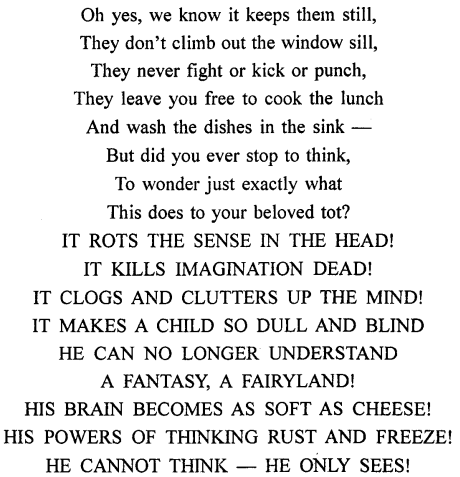
Read the lines given above and answer the questions given below.
Question 1.
Explain with reference to context.
Answer:
These lines are taken from the poem TELEVISION, written by Roald Dahl, a British novelist, short story writer and a poet. It is taken from his collection ‘Revolting Rhymes’. It is a stinging satire on Television. In this poem Roald Dahl expresses concern over what the modem invention the television set has done to children. Fie points out that watching TV has become a craze in modem time. Children of today spend hours together in front of the ‘idiot box’. Roald Dahl is addressing all British parents and telling them that the most important thing one must learn while raising children is to keep them away from the television set. He also says that it is possible to come to a better solution to the problem by not installing a television set in their homes in the’ first place.
Dahl admits that he knows that television can be a convenient way to keep children occupied. While watching television, children never cause trouble or throw tantrums. As a result, their parents can go about doing their household chores without any interruption.
However, parents do not stop to consider what television might do to their children.
Lines 25-33 are written in capitals to emphasize that they carry the main message of the poem. This message is that watching too much television fills up.the minds of children with useless facts while at the same time destroying their ability to create or understand worlds of fantasy in their imagination. It takes away their ability to think and they can only keep staring at the television screen.
Question 2.
What technique does Dahl use to convey the main message of the poem?
Answer:
To convey the main message of the poem, Dahl writes in capital letters.
Question 3.
How are televisions helpful to parents?
Answer:
Television proves helpful to parents as it keeps the children occupied and as a result ; parents can do their household chores.
Question 4.
The children Describe the effects of television on children’s mind.
Answer:
Watching television, according to the poet, is not good for younger minds. According to the poet, it kills their imagination; it blocks their minds, and makes them dull.
Lines 34-52
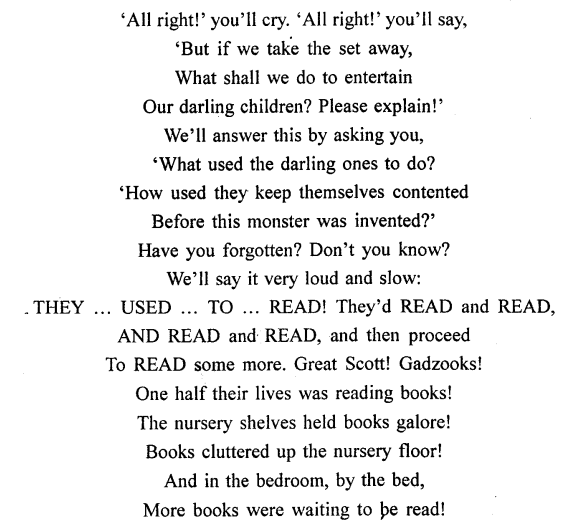
Read the lines given above and answer the questions given below.
Question 1.
Explain with reference to context.
Answer:
These lines are taken from the poem TELEVISION, written by Roald Dahl, a British novelist, short story writer and a poet. It is taken from his collection ‘Revolting Rhymes’. It is a stinging satire on Television. In this poem Roald Dahl expresses concern over what the modem invention the television set has done to children. He points out that watching TV has become a craze in modem time. Children of today spend hours together in front of the ‘idiot box’. Roald Dahl is addressing all British parents and telling them that the most important thing one must learn while raising children is to keep them away from the television set. He also says that it is possible to come to a better solution to the problem by not installing a television set in their homes in the first place.
In these lines, Dahl anticipates what the parents’ next question would be. They might agree to take away the television set from their children but will ask how they are supposed to now keep their children entertained and occupied.
In these lines, Dahl tells parents that they cannot have forgotten how children kept themselves entertained before the recent invention of the television.
In these lines, Dahl says that before the coming of television children would read and it is a shame that now they don’t.
In these lines, Dahl creates the alternate landscape that has been mentioned in the section on the poem’s setting. In this landscape, children’s rooms are filled to the brim with books.
Question 2.
According to the poet, what should be done to save children from the hypnotism of television?
Answer:
According to the poet, children should be given different story books to read in order to save children from the hypnotism of television.
Question 3.
How according to the poet, can children benefit from reading books?
Answer:
According to the poet, children should read book. It will help in developing their imagination and creative thinking skills. It will awaken their senses. It will give them enough opportunity to imagine and visualize a scene explained in the story.
Question 4.
What should be done to keep the children occupied?
Answer:
The children should be encouraged to read and read books.
Lines 53-72
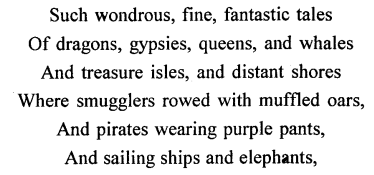
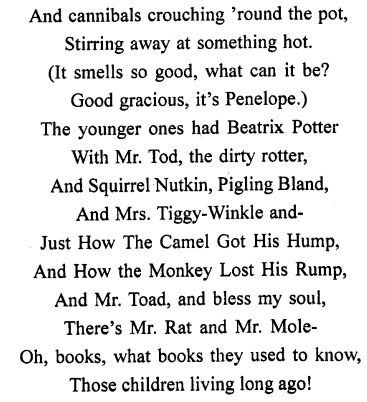
Read the lines given above and answer the questions given below.
Question 1.
Explain with reference to context.
Answer:
These lines are taken from the poem TELEVISION, written by Roald Dahl, a British novelist, short story writer and a poet. It is taken from his collection ‘Revolting Rhymes’. It is a stinging satire on Television. In this poem Roald Dahl expresses concern over what the modern invention the television set has done to children. He points out that watching TV has become a craze in modem time. Children of today spend hours together in front of the ‘idiot box’. Roald Dahl is addressing all British parents and telling them that the most important thing one must learn while raising children is to keep them away from the television set. He also says that it is possible to come to a better solution to the problem by not installing a television set in their homes in the first place.
In these lines, Dahl talks about the kind of typical fantasy stories that the children would read in his day. These were stories of adventure with many interesting characters.
In these lines, Dahl pays a tribute to another children author like him- Beatrix Potter. Potter’s books were known for the use of animals as characters, and the various colorful illustrations.
Question 2.
Why does Dahl call television an idiot box?
Answer:
The television according to Dahl makes children lose their imagination and creativity. It dulls their sensibilities and they behave like zombies. Hence they lose their ability to think for themselves. So Dahl calls it an idiot box.
Question 3.
To which author does Dahl pay a tribute?
Answer:
Dahl pays a tribute to another children author like him- Beatrix Potter. Potter’s books were known for the use of animals as characters, and the various colourful illustrations.
Question 4.
Which animal characters does Dahl mention?’
Answer:
Dahl mentions animal characters from Beatrix Potter’s books like the squirrel, toad, mole and camel.
Lines 73-80
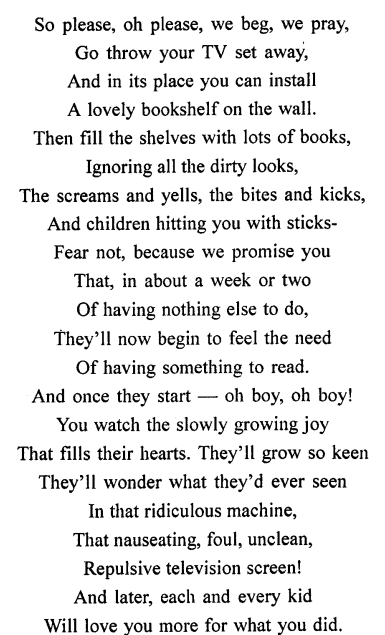
Read the lines given above and answer the questions given below.
Question 1.
Explain with reference to context.
Answer:
These lines are taken from the poem TELEVISION, written by Roald Dahl, a British novelist, short story writer and a poet. It is taken from his collection ‘Revolting Rhymes’. It is a stinging satire on Television. In this poem Roald Dahl expresses concern over what the modem invention the television set has done to children. He points out that watching TV has become a craze in modern time. Children of today spend hours together in front of the ‘idiot box’. Roald Dahl is addressing all British parents and telling them that the most important thing one must leam while raising children is to keep them away from the television set. He also says that it is possible to come to a better solution to the problem by not installing a television set in their homes in the, first place.
In these lines, Dahl makes an earnest appeal to parents to throw away their television set and replace it with a bookshelf, ignoring all the objection of their children.
In these lines, Dahl feels sure that sooner or later the children will turn to reading books to pass the time.
In these lines, Dahl says that the children will not be able to stop reading books once they have started and then will wonder why they had ever liked watching television. In the end the children will thank their parents for introducing them to books.
Question 2.
What does Dahl ask the parents to do?
Answer:
Dahl asks the parents to throw away the television sets and replace them with shelves crowded with books of all kinds.
Question 3.
Will the children appreciate this action of their parents?
Answer:
Initially the children will be angry with their parents but when they have nothing else to do they will start reading the books. And then the joy of reading will envelop them and they will wonder why they ever watched television.
Question 4.
Will the children thank the parents? Why?
Answer:
Yes, once the children discover the pleasure of reading they will thank their parents for introducing them to reading.
Project
Question 1.
Explain and discuss the themes of the poem.
Answer:
Idiot Box:
That the television is called the ‘idiot box’ might have something to do with the kinds of effect Dahl imagines it has in children. This phrase is actually a transferred epithet, in the sense that it is not the television set that is idiotic, but that idiocy is produced in the watchers of television. When we watch television, it is a passive process on our parts. We do not actively engage with the material as we do while reading and imagining the words on the page coming to life. This passivity ultimately makes the work of our brain slower and more strained.
Death of imagination:
Amidst all the people of his time, Dahl was perhaps singularly ahead of his time when he predicted that television would spell the death of imagination in children’s minds. As a children’s author, he must have known more than others how children’s faces light up when they read or listen to a story, and how they often lose „ themselves in the details of a book as their imagination constructs entire worlds for them in their minds. However, television hands them ready images. As a result, their imagination suffers and they later become sceptical in thinking that what they cannot see is not real. If all children thought that way, an author like Dahl would actually go out of business.
Reading as a habit to be inculcated:
Even though Dahl was writing primarily for children, the message of this particular poem seems more intended for their parents than for them. Dahl believes that it is a parent’s duty to inculcate the habit of reading in his or her children. Children might not know any better than watching television for hours, but parents do. In their hurry to get all their work finished, they ignore their children’s long hours of television-watching. However, by putting their own convenience aside, they should introduce their children to the wonderful world of books.
Question 2.
How does Dahl compare the leisure activities of children in the past and their activities now.
Answer:
The poem TELEVISION is, written by Roald Dahl, a British novelist, short story writer and a poet. It is taken from his collection ‘Revolting Rhymes’ It is a stinging satire on Television. In this poem Roald Dahl points out how TV crushes the creativity and spontaneity of children. He laments that children do not read books any more. He reflects with nostalgia on olden days when children eagerly immersed themselves in books.
In the past reading was the main activity and hobby of children books would lie scattered in every nook and corner of the house. Children read books with enthusiasm and keen interest. They would be transported at once to a land of fantasy. Their imagination would be stimulated and their mind would be active.
With the advent of TV, however, a marked change can be seen in children. The child of today spends hours together in front of the ‘idiot box’. He does nothing else all day. He is fascinated by the meaningless entertainment that is churned out on TV. He loses the capacity to think. He behaves like a zombie, as though he Dahl believed that young people need to experience life to really grow and thrive. He was concerned that watching too-much television worked against actualizing a child’s potential. .
Question 3.
Dahl is annoyed that people – including children – watch too much television. Do you agree, or disagree? Why, or why not?
Answer:
Yes I agree. Television dulls the senses and one behaves like a zombie. I share Roald Dahl’s judgement about the television set & its morbid shows that are turning our young generation into zombies where thinking is concerned. Values, morals and ethics are thrown into the dustbin & bizarre information provided by the media is being constantly chewed & digested by children these days…and also by adults at times…if not all the time.
A person who watches television all day loses the capacity to think. Dahl believed that young people need to experience life to really grow and thrive. He was concerned that watching too-much television worked against actualizing a child’s potential. Dahl believed that young people need to experience life to really grow and thrive. He was concerned that watching too-much television worked against actualizing a child’s potential. Television hands them ready images. As a result, their imagination suffers and they later become sceptical in thinking that what they cannot see is not real.
Question 4.
Do you think Dahl is being extreme when he recommends that television sets should be tossed-out of our homes? Is there a balance which could be struck between watching television and reading books? What would that balance be?
Answer:
Roald Dahl in this poem describes the way an adult can initiate the reading habit in children by throwing the television away! I would not go to that extreme but, I would certainly delimit television watching among children. According to Roald Dahl, by the installation of a book shelf with a lot of books, children in a few days time would definitely take the hint and start to read. I use the same method of suggestion by setting up a lot of books in the house which indirectly will influence their minds. Television has its uses. We can see the cultures and traditions of far away countries without visiting them. We learn about their habits, climate, traditions etc. But like all things watching television should be within limits. Other forms of entertainment like reading should also be encouraged. Reading helps to sharpen our sensibilities and improve our language skills and vocabulary. It enhances our creativity. So there should be a balance between watching television and reading.
Question 5.
What is the rhyme scheme of the poem?
Answer:
Roald Dahl follows the same simple rhyme scheme throughout this poem – AABB and so on in a series of rhyming couplets. Only on one occasion does he diverge from this when the end words of the lines rhyme in lines 31, 32 & 33.
Question 6.
Explain the use of the rhetorical device like the apostrophe by the poet.
Answer:
This rhetorical device is used when a poet addresses his or her poem to an absent audience. Dahl uses the device of apostrophe when he addresses his poem to English parents and advises them on doing away with their television sets.
Question 7.
How has Dahl used personification in his poem?
Answer:
Dahl uses the device of personification in two cases – first, when he gives television the human ability to kill something, and second, when he gives ‘Imagination’ the human ability to die at its hands.
Question 8.
Explain and analyse the use of hyperbole in the poem.
Answer:
If we look at the expression rots, kills, dead, clogs, clutters, dull ad blind, as soft cheese, rust and freeze, they are full of negative connotation and exaggeration. They are there to emphasises the threat brought by television to the child’s growth. It is not a matter of fact that the voice is talking about but the impacts of television are seen as negative as that expression. The word choices support the tone of anger, anxiety, even sarcastic of the voice. Consequently, they reveal the negative attitude of the voice towards television.
Question 9.
How does the hyphen and font help to advance the theme?
Answer:
The pause made by the hyphen gives a sense of hanging. It means to invite the readers to read and think at a certain pace. As a result, voice is able to make the up and down to the emotional effect and in the same time infiltrate the readers with a continuous meaning transfer.
Any type of font does not change the meaning of the words. But the font changing in the middle of a written will change the focus and the emphasis. Here, the poet uses capitalized word for all words in the line 25-33 in a row.
Extra Questions
Question 1.
Who is the we referred to in the first line?
Answer:
The ‘we’ refers to the adults and the parents of the children who watch television continuously.
Question 2.
What is the advice of the poet? Is there any relevance of this advice to our present day?
Answer:
The poet advices parents not to install the television or if installed to throw it away. Yes, it is relevant today as children have started watching television and given up reading.
Question 3.
When do eyes pop out?
Answer:
Eyes pop out when the children stare continuously at the television and stare unblinkingly at it.
Question 4.
Which figure of speech is used in the lines:
(Last week in someone’s place we saw
A dozen eyeballs on the floor.)
Answer:
The poet has used hyperbole to exaggerate.
Question 5.
What are the advantages of reading mentioned by Dahl?
Answer:
He states in his poem in a very unique fashion that before the television had come to pass, children used to spend their time reading quality books which he states in an indirect manner:
- Develops their imagination
- Sharpens their senses
- Transports them to the most wonderful places
- Allows them to spend their leisure time qualitatively.
Question 6.
Explain the phrase, that ‘shocking ghastly junk’.
Answer:
This phrase refers to all the useless, mind numbing visuals that the children watch on the television.
Question 7.
What is the activity referred to later in the poem, that sharpens their brains?
Answer:
The activity of reading books sharpens the brains of the children.
Question 8.
Why has the poet used the expressions, ‘ Great Scott’ and ‘Gadzooks’?
Answer:
Great Scott is an expression used to express shock and disbelief and Gadzooks means god’s hooks or the nails on the cross and is a kind of oath. The poet wants to emphasize the importance of reading and the uselessness of watching television.
Question 9.
What kinds of stories captivated the young minds in the past?
Answer:
In the past children’s minds were captivated by fairy tales, adventure stories, stories about magic and wonder and about voyages etc.
Question 10.
Who was Beatrix Potter?
Answer:
Beatrix Potter was a children-books author like Dahl. Potter’s books were known for the use of animals as characters, and the various colourful illustrations.
Question 11.
Whose dirty looks are referred to?
Answer:
The poet refers to the angry looks of the children to their parents when they throw away the television sets.
Question 12.
What impression do you get of the children after reading the poem?
Answer:
The impression one gets of the children is that they are spoil and rude and have no energy and zest left in them. They appear dull and stupid.
Question 13.
Why is the poet so much against watching television? Give two reasons.
Answer:
The poet is against watching television because it makes children devoid of creativity and imagination. And secondly, they start believing that only what they see in television is the reality.
For More Resources
